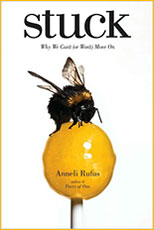"Are you stuck or are you where you should be? The only one who can answer that is you. What is the flame that melts your ice? The solvent that dissolves your glue? The bulldozer that clears your wreckage? The bolt cutter that severs your chains?" These are some of the questions Anneli Rufus poses in this astonishingly insightful book organized about being stuck. There are chapters on the past, the present, habits, trauma, others, and work. This thought-provoking paperback of cultural criticism covers a lot of territory as Rufus probes the unhappiness of many American citizens who feel trapped, bored, and in a rut. She also takes a look at some of the self-imposed obstacles which keep us imprisoned: denial, fear, obsession, confusion, and delusion. It is possible to escape from our stuckness but it takes will power, creativity, and adult maturity.
The past is where we came from, says Rufus; it is our home. In our interpretation of yesteryear, we control time and the storyline. Many cling to the past as if it were a life-preserver. But it isn't, and it can be a dreadful place to be stuck. Look at the rigid worldviews of Fundamentalists of all stripes who abhor the present and disdain a post-modern future. Check out those addicted to historical re-enactments such as the battles of the Civil War.
In a time when many spiritual seekers talk about trying to live fully in the present moment, Rufus offers a critique of being stuck in the present. Most of her sharp-edged commentary is aimed at "the get-it-now headspace" which engenders a troubling self-absorption. She gives an example of seeing a mother and a little girl whose T-shirt said:
1. I want it.
2. You buy it for me.
Any questions?
There are no questions about this from anyone living in our instant-gratification culture. Living totally in the moment can result in giving short-shrift to future generations.
We are all familiar with New Year's resolutions and how hard it is to change old, entrenched habits. We get tangled up in old tapes, repeating them again and again, despite our aspirations to do a new thing. Rufus rants against the widely accepted idea that bad habits are not personal choices but diseases. Other cultural commentators agree: disease theory is bad science that is warping our culture and character. The author laments what she sees as the widespread abdication of adult responsibility in this pop phenomenon.
In the last three chapters, Rufus examines the stuckness of trauma, the prison of dependence (American adults returning home and living with their parents as one example), and the world of work where lost privileges, lost wages, and lost benefits are the name of the game.
